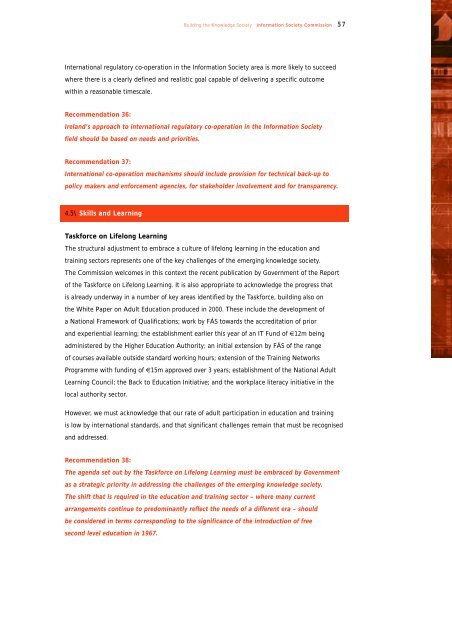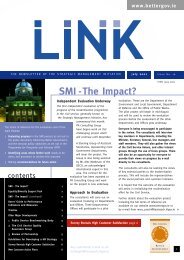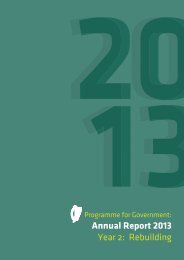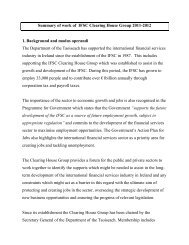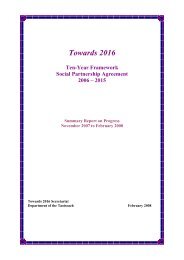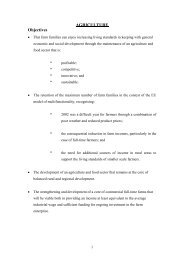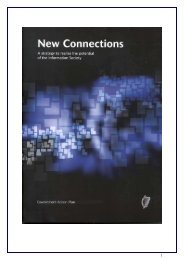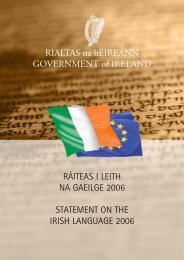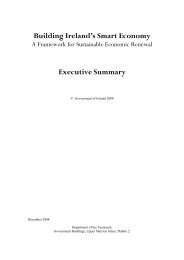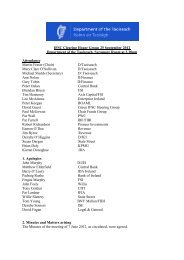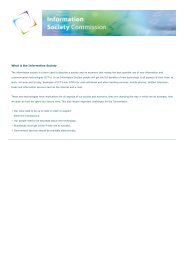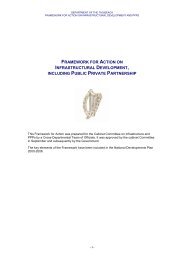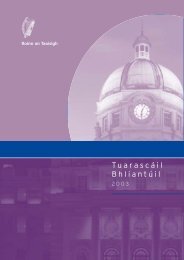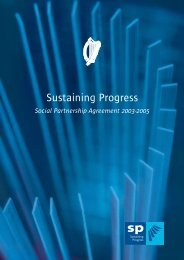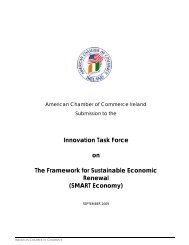Building the Knowledge Society - Department of Communications ...
Building the Knowledge Society - Department of Communications ...
Building the Knowledge Society - Department of Communications ...
You also want an ePaper? Increase the reach of your titles
YUMPU automatically turns print PDFs into web optimized ePapers that Google loves.
<strong>Building</strong> <strong>the</strong> <strong>Knowledge</strong> <strong>Society</strong> Information <strong>Society</strong> Commission 57International regulatory co-operation in <strong>the</strong> Information <strong>Society</strong> area is more likely to succeedwhere <strong>the</strong>re is a clearly defined and realistic goal capable <strong>of</strong> delivering a specific outcomewithin a reasonable timescale.Recommendation 36:Ireland’s approach to international regulatory co-operation in <strong>the</strong> Information <strong>Society</strong>field should be based on needs and priorities.Recommendation 37:International co-operation mechanisms should include provision for technical back-up topolicy makers and enforcement agencies, for stakeholder involvement and for transparency.4.5\ Skills and LearningTaskforce on Lifelong LearningThe structural adjustment to embrace a culture <strong>of</strong> lifelong learning in <strong>the</strong> education andtraining sectors represents one <strong>of</strong> <strong>the</strong> key challenges <strong>of</strong> <strong>the</strong> emerging knowledge society.The Commission welcomes in this context <strong>the</strong> recent publication by Government <strong>of</strong> <strong>the</strong> Report<strong>of</strong> <strong>the</strong> Taskforce on Lifelong Learning. It is also appropriate to acknowledge <strong>the</strong> progress thatis already underway in a number <strong>of</strong> key areas identified by <strong>the</strong> Taskforce, building also on<strong>the</strong> White Paper on Adult Education produced in 2000. These include <strong>the</strong> development <strong>of</strong>a National Framework <strong>of</strong> Qualifications; work by FÁS towards <strong>the</strong> accreditation <strong>of</strong> priorand experiential learning; <strong>the</strong> establishment earlier this year <strong>of</strong> an IT Fund <strong>of</strong> €12m beingadministered by <strong>the</strong> Higher Education Authority; an initial extension by FÁS <strong>of</strong> <strong>the</strong> range<strong>of</strong> courses available outside standard working hours; extension <strong>of</strong> <strong>the</strong> Training NetworksProgramme with funding <strong>of</strong> €15m approved over 3 years; establishment <strong>of</strong> <strong>the</strong> National AdultLearning Council; <strong>the</strong> Back to Education Initiative; and <strong>the</strong> workplace literacy initiative in <strong>the</strong>local authority sector.However, we must acknowledge that our rate <strong>of</strong> adult participation in education and trainingis low by international standards, and that significant challenges remain that must be recognisedand addressed.Recommendation 38:The agenda set out by <strong>the</strong> Taskforce on Lifelong Learning must be embraced by Governmentas a strategic priority in addressing <strong>the</strong> challenges <strong>of</strong> <strong>the</strong> emerging knowledge society.The shift that is required in <strong>the</strong> education and training sector – where many currentarrangements continue to predominantly reflect <strong>the</strong> needs <strong>of</strong> a different era – shouldbe considered in terms corresponding to <strong>the</strong> significance <strong>of</strong> <strong>the</strong> introduction <strong>of</strong> freesecond level education in 1967.


